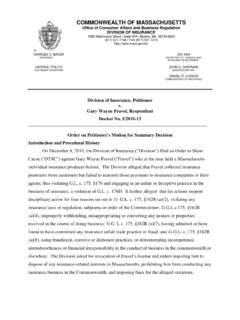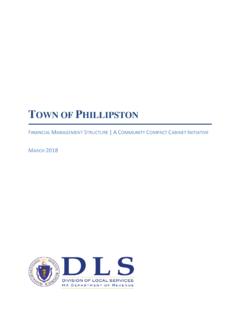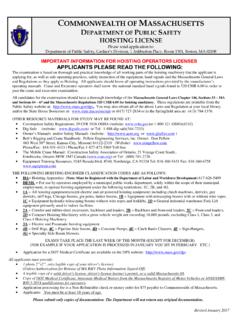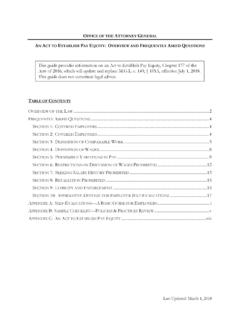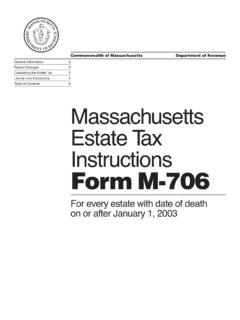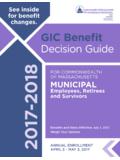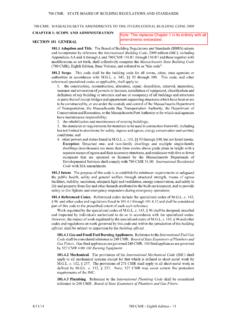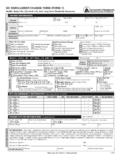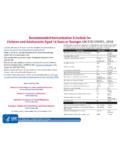Transcription of NOTICE: All slip opinions and orders are subject to formal ...
1 NOTICE: All slip opinions and orders are subject to formal revision and are superseded by the advance sheets and bound volumes of the Official Reports. If you find a typographical error or other formal error, please notify the Reporter of Decisions, Supreme Judicial Court, John Adams Courthouse, 1. Pemberton Square, Suite 2500, Boston, MA, 02108-1750; (617) 557- 1030; 18-P-571 Appeals Court JAMES CUTICCHIA & others1 vs. TOWN OF ANDOVER & No. 18-P-571. Essex. January 9, 2019. - April 3, 2019. Present: Milkey, Maldonado, & Kinder, JJ. Municipal Corporations, Group insurance. Insurance, Group, Premiums. Public Employment, Retirement benefits.
2 Retirement. Statute, Construction. Practice, Civil, Summary judgment. Civil action commenced in the Superior Court Department on August 15, 2016. The case was heard by James F. Lang, J., on motions for summary judgment. Harold L. Lichten for the plaintiffs. John Foskett (Ryan P. Dunn also present) for the defendants. 1 William Canane, Dennis Lane, and the Andover Educators Association (which was granted leave to intervene). For convenience, we refer to the plaintiffs and the plaintiff- intervener as "the plaintiffs.". 2 Town manager of Andover and board of selectmen of Andover. 2. MILKEY, J. In 2016, the town of Andover increased the percentage share that retired town employees had to pay for their health insurance.
3 Three retired town employees brought this action alleging that G. L. c. 32B, 22 (e), prohibited the town from implementing such increases prior to July 1, On cross motions for summary judgment, a Superior Court judge ruled that the language of 22 (e) unambiguously supported the town's position that the increases were lawful. For the reasons that follow, we vacate the judgment. 1. Statutory background. A municipality may, but is not required to, provide health insurance coverage to its employees and retirees. Somerville v. Commonwealth Employment Relations Bd., 470 Mass. 563, 564 (2015). Where a municipality has chosen to provide such coverage, it generally has a variety of options regarding the percentage it will contribute towards the insurance premiums.
4 Although G. L. c. 32B, 9, states that retirees are to bear the full cost of their health insurance, municipalities may elect to pay a share of those premiums by "accept[ing] the more generous provisions of G. L. c. 32B, 9A. or 9E." Id. at 565. By opting into 9A, the municipality can pay fifty percent of the premiums, and by opting into 9E, they can pay a higher percentage. Id. 3 The claim was brought as a class action, but it was dismissed before being certified. 3. In Somerville, the Supreme Judicial Court addressed the question whether a municipality that had elected to opt into 9E could "unilaterally reduce[] its percentage contribution to retired employees' health insurance premiums without engaging in collective bargaining over the matter with current employees.
5 ". Id. at 573. The court held that a town could do so, thus reaffirming that municipalities enjoyed broad statutory authority to raise the percentage share that retirees had to pay for their health insurance premiums. See id. In 2011, the Legislature enacted a law to allow municipalities to pursue additional cost savings in the provision of their health insurance plans. See St. 2011, c. 69, 3, inserting G. L. c. 32B, 21-23 (2011 act). Specifically, municipalities now could elect to opt into a program through which they could redesign their health insurance plans, , through changing the copayments and deductibles that those enrolled in the plans had to pay, and through adopting "tiered provider network copayments and other cost-sharing plan design features.
6 " G. L. c. 32B, 22 (a). The 2011 act created a sui generis, streamlined process through which such changes were to be negotiated or, barring an agreement, determined by a specially constituted "municipal health insurance review panel.". G. L. c. 32B, 21 (c). While union representatives were given 4. an important role in that process,4 the process otherwise by- passed ordinary collective bargaining. See G. L. c. 32B, 23. (a), (c), (g) (providing that decisions by municipality to redesign its health insurance plans are not subject to collective bargaining). Notably, the new authority offered by the 2011 act was layered on top of the authority that municipalities already possessed to decrease the percentage share that they contributed to their retirees' health insurance premiums.
7 See G. L. c. 32B, 9A, 9E. This meant that retirees now potentially could be subjected to two types of increases implemented outside the traditional collective bargaining process: increases to the percentage share that they had to pay for their premiums, and increases to their copays, deductibles, and the like. As both sides agree, when the Legislature enacted the 2011 act, it placed temporary limits on the ability of municipalities to subject retirees to increases on both fronts. Specifically, municipalities who elected to use their new authority to implement design changes to their insurance plans outside collective bargaining temporarily were precluded from using their already existing authority to raise the percentage share that retirees had to pay.
8 As governor Patrick stated in 4 See G. L. c. 32B, 21 (b) (creating "public employee committee" comprised of union and retiree representatives). 5. proposing the language establishing this moratorium,5 the purpose was "the protection of current retirees from short-term increases in premiums." governor 's message , 2011 House Doc. No. 3581. Although the parties before us generally agree about the role that the moratorium was intended to serve, they disagree about the details as to how the moratorium was intended to operate and, most specifically, when municipalities would be relieved from its effects. As enacted by St.
9 2011, c. 69, 3, the moratorium language set forth in 22 (e) reads as follows: "The first time a public authority implements plan design changes under this section or section 23, the public authority shall not increase before July 1, 2014, the percentage contributed by retirees, surviving spouses and their dependents to their health insurance premiums from the percentage that was approved by the public authority prior to and in effect on July 1, 2011.". In 2014, the Legislature amended this language by substituting "2016" for "2014." St. 2014, c. 165, 76. In 2016, the Legislature again amended the language by substituting "2018".
10 For "2016." St. 2016, c. 133, 45. On both occasions, the remainder of the language was left the same. 5 The amendment to G. L. c. 32B was originally proposed as an outside section of the fiscal year 2012 budget. The governor proposed the moratorium language in his statement returning certain outside sections of the fiscal year 2012 budget with vetoes and amendments. 6. 2. Background. The town previously had elected to opt into 9E, under which towns pay more than fifty percent of their retirees' health insurance premiums. Specifically, as of 2011, the town was covering between sixty-five percent and eighty-six percent of those premiums.
